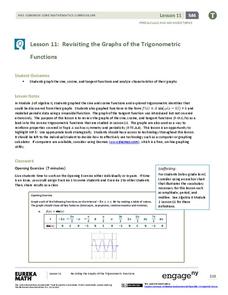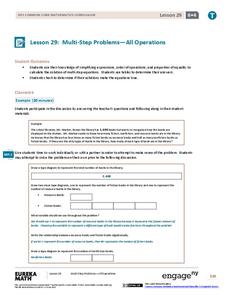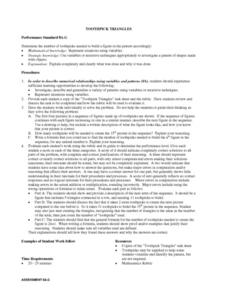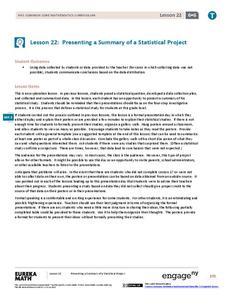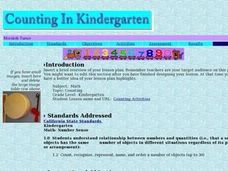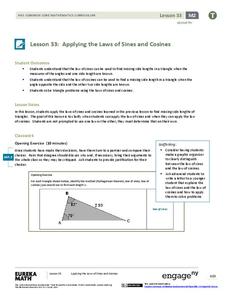EngageNY
An Exercise in Creating a Scale Drawing
Design your dream classroom. The lesson plan contains an exercise to have teams create a scale drawing of their dream classroom. Pairs take the measurements of their classroom and furniture and create a scale factor for them. To finish...
EngageNY
Revisiting the Graphs of the Trigonometric Functions
Use the graphs of the trigonometric functions to set the stage to inverse functions. The lesson reviews the graphs of the basic trigonometric functions and their transformations. Pupils use their knowledge of graphing functions to model...
EngageNY
Multi-Step Problems—All Operations
Harness the power of algebra to solve problems. Young mathematicians learn to work out multi-step problems by applying algebraic techniques, such as solving equations and proportions. They use tape diagrams to model the problem to finish...
Kenan Fellows
Weight and Balance of an Airplane
A career in aeronautics might be calling your class members. Building from the previous two lessons in the series, learners continue analyzing the mathematics of aeronautics. Groups create a paper airplane using paperclips for balance....
Curated OER
Toothpick Triangles
Learners draw a chart (included in the lesson) to use with their investigation. They review terminology of triangles and receive toothpicks to use in the lesson. Beginning with three toothpicks, students form a triangle. They complete...
EngageNY
Estimating a Population Proportion
Find the percent of middle schoolers who want the ability to freeze time. The 21st installment in a series of 25 has groups collect a random sample of respondents who answer a question about superpowers. Using sample statistics,...
EngageNY
Replacing Letters with Numbers
When did letters become the same as numbers? Scholars learn about substituting numbers for letters to evaluate algebraic expressions in the seventh part in a series of 36. The lesson focuses on expressions related to geometry, such as...
EngageNY
Presenting a Summary of a Statistical Project
Based upon the statistics, this is what it means. The last instructional activity in a series of 22 has pupils present the findings from their statistical projects. The scholars discuss the four-step process used to complete the project...
Curated OER
Buying Cars/Financing Cars Compound Interest
Provide a real world context in which exponential functions are used to determine a eal world phenomena such as compound interest and exponential growth. This lesson should be taught after students have mastered the laws of exponents and...
Curated OER
Counting in Kindergarten: Make Number Books
Emergent math masters practice 1:1 correspondence, number recognition, and quantity-to-number relationships. They view number flashcards, state the correct number name, and circle the corresponding numeral to represent the number of...
Curated OER
Fantastic Fractions
Young math whizzes solve 20 various types of equations related to fractions. First, they state each portion shaded as a fraction in lowest terms. Then, they determine the missing numerator or denominator and determine the value of each...
Curated OER
Adding and Subtracting Polynomials
For use with a TI-nspire calculator, this lesson focuses on adding and subtracting polynomials. Learners use calculator to add and subtract polynomials using both the vertical method horizontal methods. A class discussion follows the...
Curriculum Corner
Guest Teacher Plans: Kindergarten
Emergencies happen. Be prepared the next time you have to call in a substitute with a lesson plan designed to meet the needs of a kindergarten class. Throughout the day, class members work with number and alphabet cards, identify numbers...
EngageNY
End-of-Module Assessment Task: Grade 8 Module 1
It's all in the numbers. Determine your pupils' level of understanding of scientific notation using this assessment task. The final lesson in the series assesses scholars on the application of scientific notation in real-life...
EngageNY
Sequencing Translations
Investigate the results of multiple translations on an image. Scholars use vectors to perform a sequence of translations in the seventh lesson of 18. They examine the results and determine the importance of using a sequence rather than a...
EngageNY
Converse of the Pythagorean Theorem
Discover a new application of the Pythagorean Theorem. Learners prove and apply the converse of the Pythagorean Theorem in the 17th lesson in a 25-part series. The examples ask learners to verify right triangles using the converse...
Science Matters
Richter Scale
The 12th lesson in a series of 20 opens with a demonstration of exponential functions using pasta. This concept is connected to the Richter Scale, which is also an exponential function. Scholars compare the exponential scale that...
EngageNY
Ordering Integers and Other Rational Numbers II
Individuals build on prior knowledge to order a set of rational numbers from least to greatest or greatest to least. As part of the lesson, they order rational numbers written in different forms.
Curated OER
Concepts in Algebra
Study Islamic achievement in mathematics by exploring the six standard forms of equations. High schoolers will review the six forms of equations of Al-Khwarizmi. They solve equations using different forms. Links and resources are...
Curated OER
The Very Hungry Caterpillar
A good book deserves to be followed up by a good worksheet. Here is a great resource which is intended for use after reading The Very Hungry Caterpillar by Eric Carle. It includes several activity ideas that promote skill development in...
EngageNY
Applying the Laws of Sines and Cosines
Breaking the law in math doesn't get you jail time, but it does get you a wrong answer! After developing the Law of Sines and Cosines in lesson 33 of 36, the resource asks learners to apply the laws to different situations. Pupils must...
EngageNY
Margin of Error When Estimating a Population Mean (part 1)
We know that sample data varies — it's time to quantify that variability! After calculating a sample mean, pupils calculate the margin of error. They repeat the process with a greater number of sample means and compare the results.
EngageNY
Drawing a Conclusion from an Experiment (part 2)
Communicating results is just as important as getting results! Learners create a poster to highlight their findings in the experiment conducted in the previous lesson plan in a 30-part series. The resource provides specific criteria and...
EngageNY
Building Logarithmic Tables
Thank goodness we have calculators to compute logarithms. Pupils use calculators to create logarithmic tables to estimate values and use these tables to discover patterns (properties). The second half of the lesson has scholars use given...
Other popular searches
- Time Zone Lesson Maths
- Math Lessons Time Duration
- Time Math Lesson Plans
- Math Lessons Time
- Maths Time Lesson
- Christmas Math Lesson on Time
- Math Lessons on Time
- Maths Time Lesson Plans
- Math Lessons Telling Time



